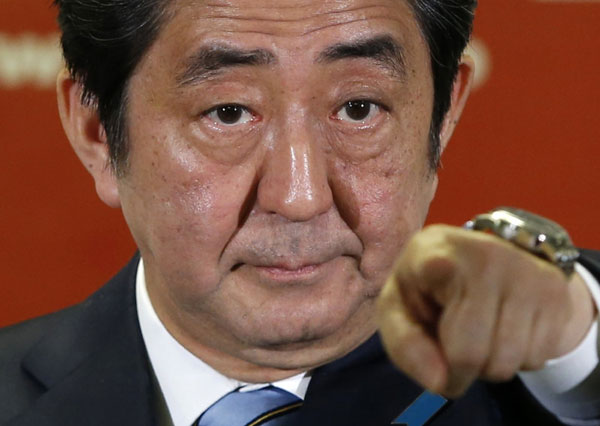Asia's moment of peace waits for Japan
By Cai Hong (China Daily) Updated: 2015-01-12 08:17
 |
|
Japan's Prime Minister and the leader of the ruling Liberal Democratic Party (LDP), Shinzo Abe, points to a reporter during a news conference following a victory in the lower house elections by his ruling coalition, at the LDP headquarters in Tokyo, in this December 15, 2014 file photo. [Photo/Agencies] |
On June 4, 2004, Gerhard Schroder became the first German chancellor to stand alongside the leaders of Germany's wartime enemies in France, marking the 60th anniversary of the Normandy landings, which were a prelude to the end for the Third Reich.
"Hugely symbolic," Schroder, who accepted the invitation from then-French President Jacques Chirac, said of his attendance in France. "It means World War II is finally over."
Such a hugely symbolic moment has yet to occur in Asia.
War anniversaries are still a sore point in East Asia. Media in Japan are foreseeing this year as a difficult one for the country, as it marks the 70th anniversary of the end of WWII on Aug 15, when Japan surrendered unconditionally to the Allied Powers in 1945. Unlike Europe, Asia's former enemies have never come together to commemorate the end of the war.
This year is also the 50th anniversary of normalization of diplomatic relations between Japan and South Korea. Although both entered office more than two years ago, Japanese Prime Minister Shinzo Abe has not been able to have a formal summit meeting with South Korean President Park Geun-hye, because of the Abe administration's claims that the Imperial Japanese Army was not involved in coercing women into sexual slavery.
In his Jan 1 remarks, Japan's Emperor Akihito asked the nation to learn from the WWII as it considers its future. He recommended starting with the Manchurian Incident of 1931.
This was when the Japanese troops stationed in Northeast China - known as Manchuria back then - detonated a bomb on the rails of the South Manchuria Railway and used it as an excuse to attack Chinese troops on Sept 18, 1931, heralding the beginning of Japan's invasion of China.
Will the 81-year-old Emperor's call for reflection on the war have the ear of his "subjects"?

I’ve lived in China for quite a considerable time including my graduate school years, travelled and worked in a few cities and still choose my destination taking into consideration the density of smog or PM2.5 particulate matter in the region.











